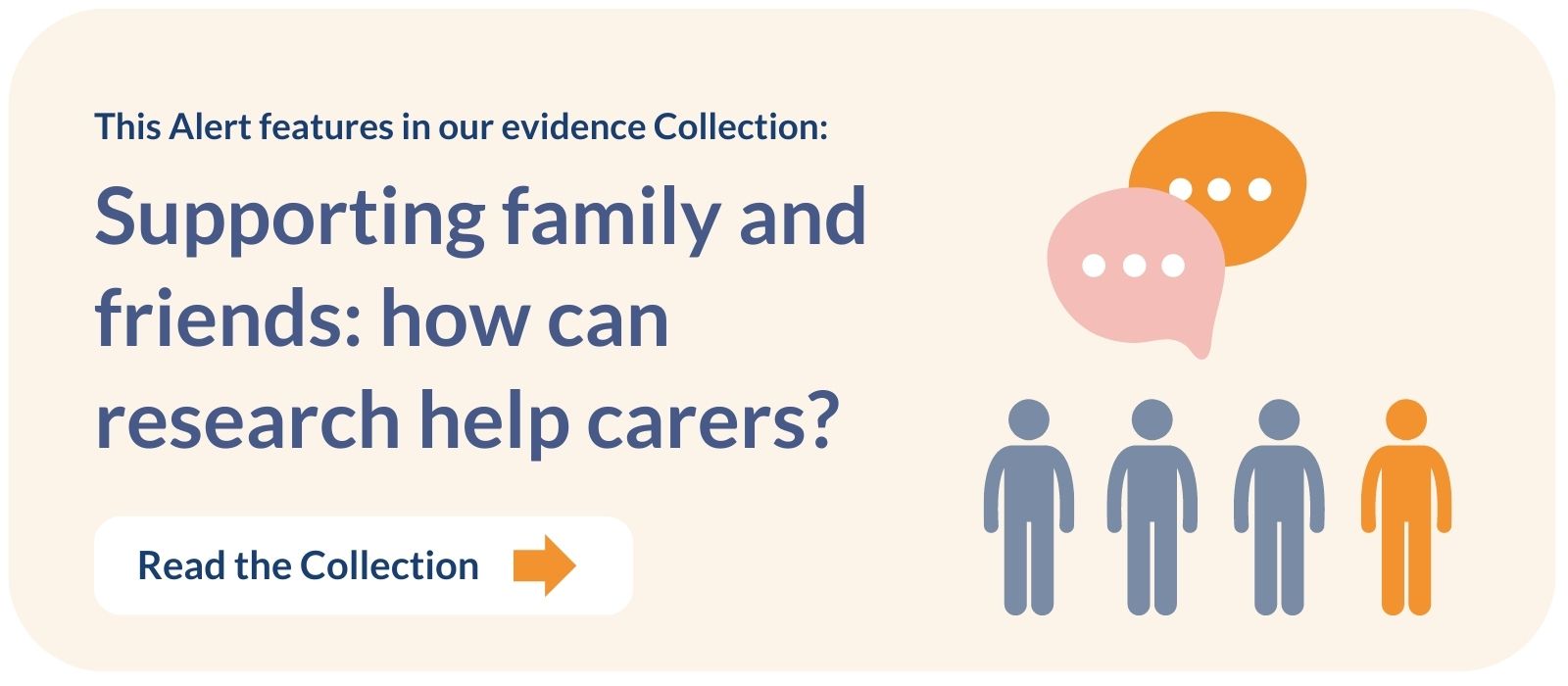This is a plain English summary of an original research article. The views expressed are those of the author(s) and reviewer(s) at the time of publication.
Online education can improve the mental health of people caring for those with dementia. A new study recommends that online education packages should be widely available for carers with anxiety or depression. Online cognitive behavioural therapy (CBT) combined with telephone support was equally effective, but used more resources.
Many of those who care for people with dementia have anxiety or depression. Support and education groups for carers can be helpful, but many are unable to attend in person. Carers who also have jobs outside the home, for example, or are unable to find replacement care, may be unable to leave their relatives.
This study compared online approaches that had been adapted specifically for carers of people with dementia. CBT, a talking therapy that helps people change the way they think and behave, was provided to one group along with telephone support. A second group received CBT without telephone support, and a third received an education package of practical information and advice.
The findings show that carers benefited from online programmes of education and from CBT with telephone support. However, carers who received online CBT without telephone support showed less improvement in their mental health. CBT alone is not being recommended.
The researchers are working with partners to decide how best the programmes can be delivered. They hope to make help available for many more carers of people with dementia.
Further information on caring for someone with dementia is available on the NHS website.
What’s the issue?
An estimated 45 million people worldwide have dementia, and most are cared for at home by their family. Caring for people with dementia can be stressful and may contribute to problems such as anxiety and depression. Support groups for these carers are not always easy to access. People may not be able to leave their relatives to attend the group, or they may be part-time carers who also have jobs. This can leave them unsupported, and at risk of worsening mental health.
CBT is a talking therapy that helps people change the way they think and behave. It is known to help other groups of people with anxiety or depression – whether given face to face or online. Education for carers of people with dementia (sometimes called psychoeducation) is a mixture of practical advice, education about dementia, and education about how to look after yourself as a carer.
CBT and education have both been shown to be effective for carers of people with dementia. But online versions of these programmes had not previously been tested in this group. The research set out to find out whether online CBT with or without telephone support, and online education, could benefit people with anxiety or depression who care for people with dementia.
What’s new?
Researchers recruited 638 people from across the UK via social and print media, through the voluntary sector, and the NHS. Participants cared for people with dementia and had scores on a mental health questionnaire that suggested they had mild to moderate anxiety or depression. They were aged between 18-101 years, and more than half were under 65 years old.
The carers were randomly allocated to receive either online CBT alone, online CBT plus telephone support, or an online education programme. All programmes included sessions on understanding dementia and the importance of carers looking after themselves.
The CBT programme then focused on experiences of anxiety, depression, anger and guilt and aimed to help carers change their ways of thinking. This could in turn improve their interactions with their relatives.
The education programme delivered information on, for example, sources of help, common difficulties and the emotional impact of dementia, positive communication, and supporting carers’ own wellbeing.
Researchers and carers worked together to design each of the programmes. They were delivered as short 20 minute sessions, with 20 sessions in all. People could work their way through them at the speed they wished, over a six month period. After six months, 208 people completed questionnaires designed to measure their mental health.
Over the six months of the study, people in all three treatment groups had improved mental health. People who had education and CBT plus telephone support showed the most improvement.
-
- Almost half (46%) of those who enrolled in the study completed at least one session of their course, and one in four (26%) completed most (80%) of it. This is in line with results of other online courses. People receiving telephone support with CBT were twice as likely to complete the course as people in the other two groups.
- The study’s key outcome was improvement in mental health problems on a 36 point scale (the General Health Questionnaire GHQ-12):
- people who received CBT plus telephone support had an average 4.8 point improvement
- those who received education had a similar (4.3 point) improvement
- those who received CBT alone showed less (2.7 point) improvement.
- Further information, from a different scale, suggested that CBT without telephone support was less effective than education. It provided less benefit for mood, depression or stress. compared to education.
Why is this important?
All three online packages led to some improvement in carers' mental health. However, education and online CBT with telephone support were most effective in relieving anxiety and depression. Online CBT without telephone support was less effective than the other options and is not being recommended.
The programmes were safe and no carer in any of the groups died or suffered serious harm. When carers’ answers suggested their mood was getting worse, or they were thinking about suicide, they received extra support. The researchers stress the importance of this safety net in delivering online programmes to people with anxiety and depression.
The education programme is cheaper to deliver, but more carers completed telephone-supported CBT. It could be that the telephone support encouraged people to continue with the course. The online education course might therefore be improved with telephone support added.
These online courses could enable far more carers of people with dementia to get the support they need to improve their mental health. At present, too few get any help at all. An online service, used by people as and when they want, is easier to access and more flexible than an in-person group or therapy. Such courses could be scaled up to reach far more people than in-person services can reach.
What’s next?
More work needs to be done to refine the education and CBT programmes in this study. They could be developed further using smart and mobile technology. And it could be that carers would benefit from more tailored programmes that take account of their age, the severity of their relative’s dementia, and how long they have been providing support.
The carers in this study volunteered to take part; they were not recruited from healthcare services. They had mild to moderate anxiety or depression. It might be that those with more severe stress or mood disorders have different needs. This needs to be explored further.
Analysis of the costs will also be necessary before programmes could be made more widely available. The researchers also emphasise the need for safety measures. They are keen that the online programmes should be used to enable people who need more help to access it. But they say it would not be responsible to introduce these online programmes outside of a trial, until support facilities are in place.
You may be interested to read
This NIHR Alert is based on: Fossey J, and others. Online Education and Cognitive Behavior Therapy Improve Dementia Caregivers’ Mental Health: A Randomized Trial. JAMDA 2020;22:7
Carers UK: a charity that provides information, advice and support for carers and campaigns to find better ways to reach and support them.
Caring for someone else: information about experiences of caring, tips for your own mental health and where to find support from Mind.
Carers Trust: a national charity that works with a network of partner organisations to provide carers with information, help and local support.
Funding: This research was funded by the Alzheimer’s Society and supported by the NIHR Oxford Health Biomedical Research Centre.
Conflicts of Interest: Several authors have received fees and funding from the Alzheimer’s Society and various pharmaceutical companies.
Disclaimer: NIHR Alerts are not a substitute for professional medical advice. They provide information about research which is funded or supported by the NIHR. Please note that views expressed in NIHR Alerts are those of the author(s) and reviewer(s) and not necessarily those of the NHS, the NIHR or the Department of Health and Social Care.

